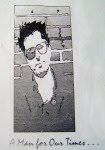The right set of barbarians...
Someone, elsewhere, was despairing that a new musical revolution like the rock and roll, Brit Invasion, pyschedelic, or punk waves of decades past had become all but impossible...
I'd say the 'last' music revolution (arguably the grunge thing -- unless you want to count the so-called 'modern metal'/screamo thing) was pretty much pre-owned by the establishment. I was really excited going in but the boring/retread angle there for most of the bands (grunge, seems to me, needed a few more Nirvanas with their pop hooks or Alice in Chains with their adventurousness). I went up to Seattle in '89 looking to connect up with grunge. I walked away decidedly unimpressed.
Look, revolution is far from impossible. But the palace guard want you to think it is.
They've been quite scientific -- and even somewhat flexible -- in maintaining -- with the assistance of the cohort of bought-and-paid for shills who have the overweening gall to call themselves "music journalists" -- the current commercial music Pax Romana.
But all it takes is the right set of conditions -- and the right set of barabarians -- to topple the empire once again.
I'd say the 'last' music revolution (arguably the grunge thing -- unless you want to count the so-called 'modern metal'/screamo thing) was pretty much pre-owned by the establishment. I was really excited going in but the boring/retread angle there for most of the bands (grunge, seems to me, needed a few more Nirvanas with their pop hooks or Alice in Chains with their adventurousness). I went up to Seattle in '89 looking to connect up with grunge. I walked away decidedly unimpressed.
Look, revolution is far from impossible. But the palace guard want you to think it is.
They've been quite scientific -- and even somewhat flexible -- in maintaining -- with the assistance of the cohort of bought-and-paid for shills who have the overweening gall to call themselves "music journalists" -- the current commercial music Pax Romana.
But all it takes is the right set of conditions -- and the right set of barabarians -- to topple the empire once again.


